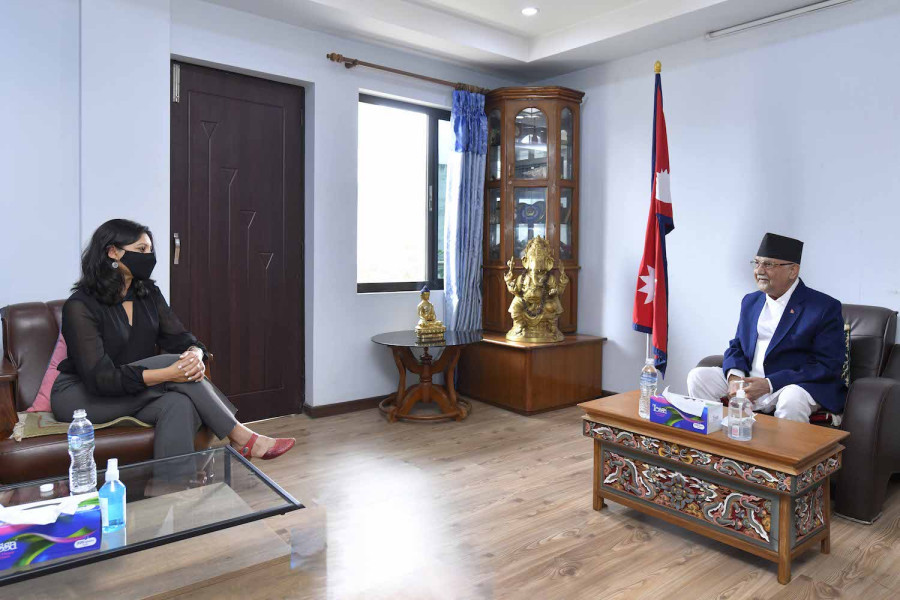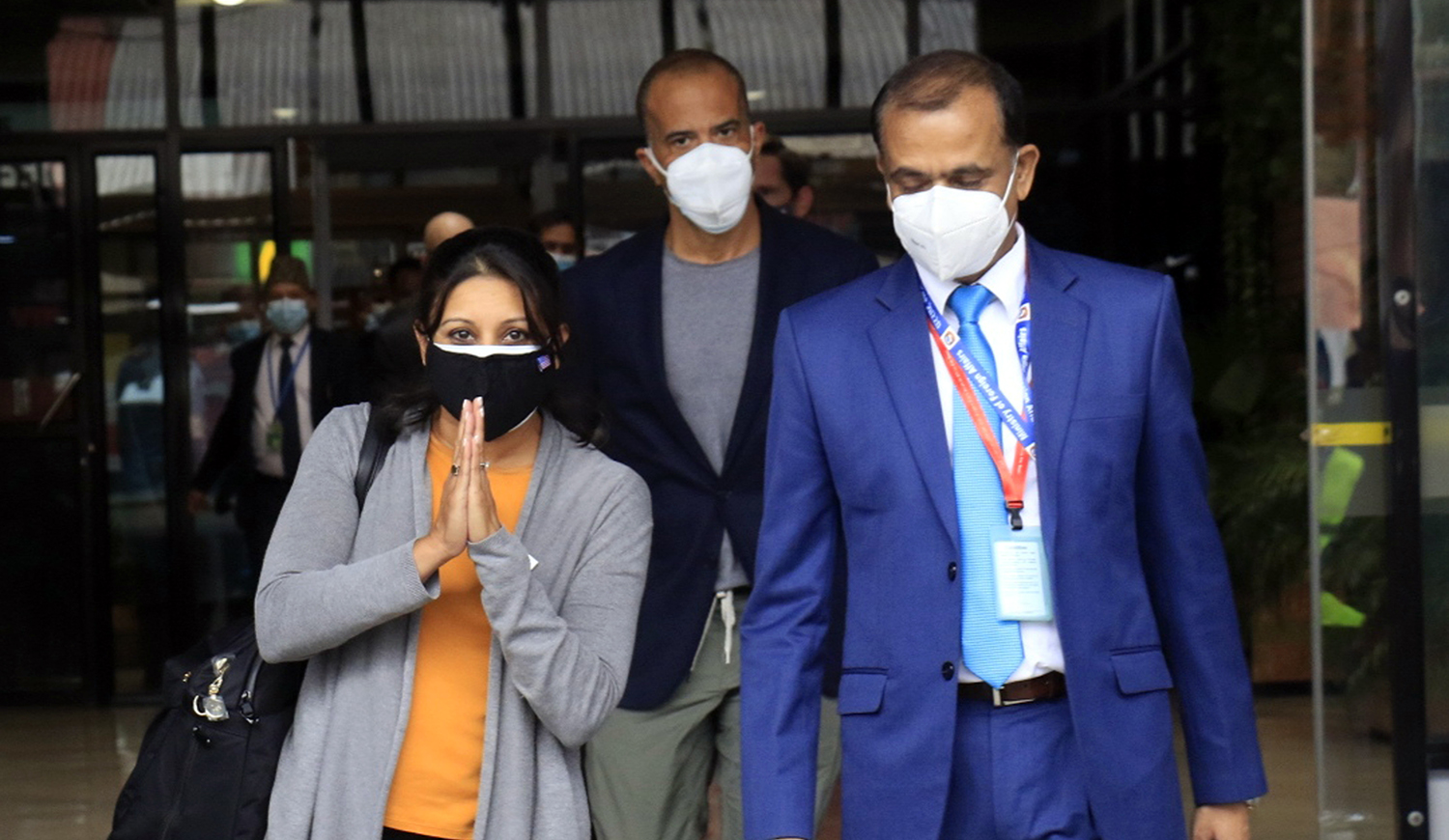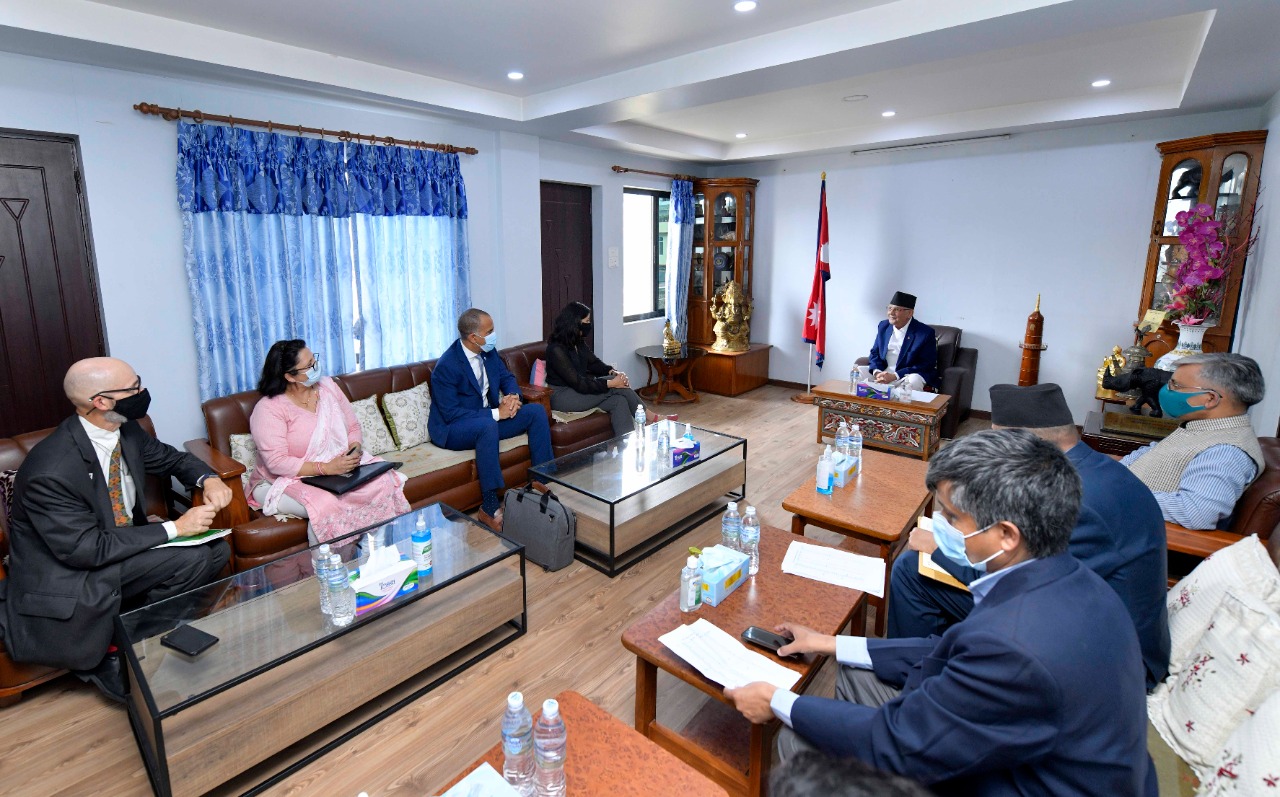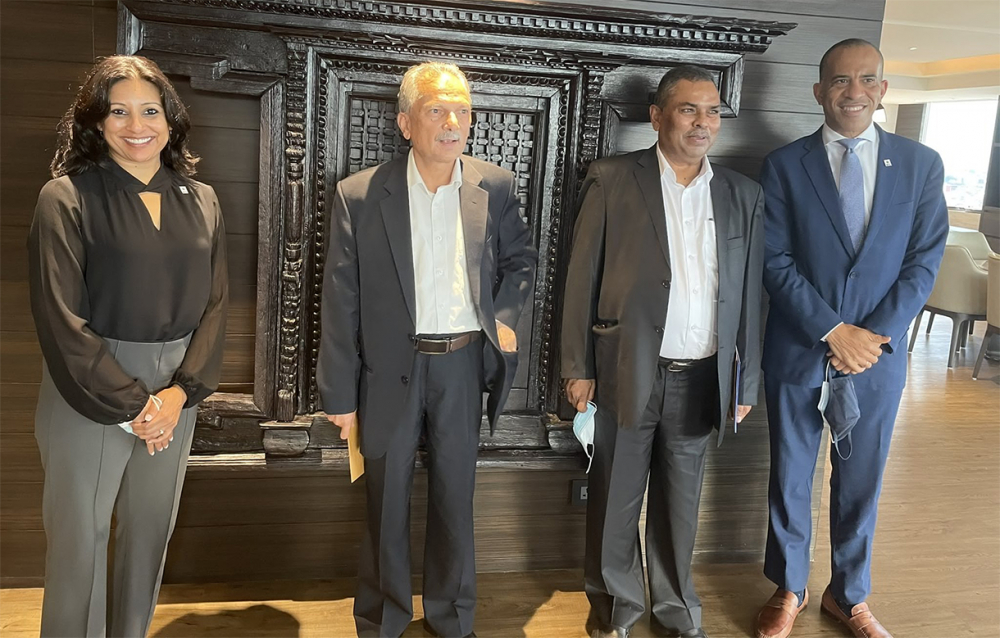National
US officials get down to business with a series of meetings, starting with Oli
MCC delegation is in Kathmandu for what appears to be one last push to get the American programme through Nepal Parliament, as the aid project hangs in the balance.
Anil Giri
In what looks like the United States’ one last effort to make the Millennium Challenge Corporation compact, a Washington-led programme under which Nepal would get $500 million in aid, materialise, top officials of the grant operations are currently in Kathmandu.
Their one push: get the Millennium Challenge Corporation Nepal Compact ratified through Parliament.
Immediately after landing in Kathmandu on Thursday morning, Fatema Z Sumar and Jonathan Brooks, vice president and deputy vice president at the MCC respectively, got down to business, starting with a meeting with KP Sharma Oli, chair of the main opposition CPN-UML who was prime minister until the second week of July, in the afternoon. They also met with CPN (Unified Socialist) chair Madhav Kumar Nepal and Janata Samajbadi Party leaders Baburam Bhattarai and Upendra Yadav.
Rajan Bhattarai, who heads the UML’s Foreign Affairs Department, said that the US delegation discussed the MCC with the party chair and wanted to know the UML’s position on the US programme.
“[We told the delegation] when we were in the government, we tried to ratify the MCC but some parties and the Speakers [Krishna Bahadur Mahara and Agni Sapkota] were reluctant to move the compact in Parliament,” Bhattarai told the Post. “Now we are in the opposition and we don’t have a position now. We will make our position clear once the ruling alliance makes its position clear.”
The senior MCC officials’ visit to Kathmandu comes a day after the MCC headquarters responded to the Finance Ministry’s 11 questions and some supplementary concerns regarding the MCC agreement.
The US programme, which has become a cause of controversy in Nepal, with Nepali political parties sharply divided, has been awaiting its parliamentary ratification for over two years now.
While the current dispensation in Kathmandu led by Nepali Congress President Sher Bahadur Deuba is keen on getting the MCC through Parliament, his coalition partners, the Communist Party of Nepal (Maoist Centre) and CPN (Unified Socialist), have some reservations.
It was because of their reservations that the Finance Ministry, headed by the former Maoist commander Janardan Sharma, on September 3 had sent some questions, asking the MCC headquarters to furnish clarifications. The concerns raised by the Finance Ministry, however, have already become an object of ridicule, observers say, as the ministry wanted to know if the MCC was above Nepal’s constitution, if it undermined Nepal’s sovereignty and if it is part of the Indo-Pacific Strategy.
The MCC in its response has already said that the Constitution of Nepal prevails over the agreement, that it does not undermine Nepal’s sovereignty and that it is not part of any security alliance.
Nepali diplomats familiar with the political line of the US State Department and MCC headquarters in Washington told the Post that since the American programme has unnecessarily become controversial in Nepal, impacting even the US’ image in Nepal, the grant should be given to another country.
“The US appears to have run out of patience as the MCC’s parliamentary ratification has been lingering for over two years now,” said a former diplomat who did not wish to be named. “So this seems to be the last chance for Nepal to either ratify the compact or lose the aid.”
Signed in September 2017, when Deuba was the prime minister backed by the Maoist Centre, the MCC Nepal Compact was registered in Parliament in July 2019 by Yubaraj Khatiwada, who was finance minister in the then Oli government.
At that time, the UML and the Maoist Centre were one party—the Nepal Communist Party (NCP). However, Oli was under pressure, as his co-chair in the party, Pushpa Kamal Dahal, now the chair of the Maoist Centre, vehemently opposed any plans to ratify the MCC compact from Parliament. The Nepal Communist Party (NCP) was invalidated by the Supreme Court in March this year, as the UML and the Maoist Centre were revived.
Now as a coalition partner of the Deuba government, the Maoist Centre, or Dahal for that matter, is in a fix. He either has to support the MCC ratification or leave it in limbo—the latter case could unravel the ruling coalition.

Afraid that he could fail to get support from his key coalition partner, Deuba in recent weeks has been trying to get Oli’s support for the MCC’s parliamentary ratification.
Observers say Sumar starting the meeting with Oli, hence, is significant. Oli’s UML, when it was in power until July, was all the MCC’s parliamentary ratification, but it now has changed its tones.
The former diplomat, who did not wish to be named, said that the MCC headquarters appears to have taken quite a liberal approach, as it has taken pains to respond to the Finance Ministry’s questions, some of which were extremely uncalled for and ridiculous.
“If the MCC Nepal Compact fails to get through Parliament during the ongoing session, we can easily assume it is a gone case,” said the diplomat.
Sumar and Brooks’ visit this time, according to many, is a last-ditch effort to convince Nepal’ political leadership that the MCC is a programme under the United States government that purely aims to support a partner country’s effort to reduce poverty and enhance economic growth.
The MCC has two projects under it—improving electricity transmission lines and roads.
The US officials are scheduled to meet with Prime Minister Deuba and other leaders as well, including Maoist Centre chair Dahal, on Friday. Sumar will also be meeting with government officials and business and community leaders.
The US embassy in Kathmandu said on Thursday that Sumar, during her meetings in Kathmandu, will discuss the required next steps to implement the MCC-Nepal infrastructure programme, address the clarification questions provided by the Ministry of Finance, and hear from the people of Nepal.

“She will specifically affirm: the MCC grant program has no military component, will not impede on Nepal’s sovereignty, and Nepal’s constitution will prevail over the agreement,” the embassy said in a statement. “Prior to negotiating and signing the compact in 2017, the government of Nepal designed the five-year grant programme to provide more reliable electricity and lower power and transportation costs for all Nepalis.”
With the UML, which is the largest party in Parliament with 98 votes, making it clear that it does not have a position right now as the opposition party, the ball is now in the ruling alliance’s court.
Top leaders of the ruling coalition on Thursday held two back-to-back meetings. It was largely expected that the coalition partners would discuss the MCC response sent on Wednesday. But insiders say that did not figure in the meeting.
The meeting mostly dwelt on issues related to House business, including the budget ordinance, according to Purna Bahadur Khadka, a general secretary of the Nepali Congress.
“There is no remarkable progress when it comes to the MCC,” Khadka told the Post.
The budget is a key issue for the incumbent government, as it has only seven days to present a replacement bill in the House, as after that the budget ordinance, presented on July 18, would get null and void.
The ruling coalition called a meeting for Friday again, ahead of Sumar’s meeting with Prime Minister Deuba, scheduled for 4pm.
Sumar on Thursday evening met with Nepal, chair of the CPN (Unified Socialist), also a coalition partner in the Deuba government. The CPN (Unified Socialist), however, has not been as rigid as the Maoist Centre, but it has some reservations about the US programme.
According to a leader who participated in the meeting, Nepal and CPN (Unified Socialist) leaders told the visiting MCC delegation that the US side also bungled in the past by making some confusing statements.
“We cannot take any decision against national interest,” said a leader who participated in the meeting, referring to the statements some US officials had made back in May 2019 with regards to the MCC and the Indo-Pacific Strategy.
“We have yet to make our position on the MCC,” said Beduram Bhusal, general secretary of the CPN (Unified Socialist). “Our previous policy on the MCC remains the same… that we cannot give the nod to its ratification unless some provisions are amended.”
The MCC headquarters, in its response, however, has made it clear that the compact cannot be amended.
“During compact development, MCC asks each government what their country’s domestic law requires in order for the compact to have the status of an international agreement that will avoid any specific conflict with domestic law,” the MCC has said. “For Nepal, the government, through Nepal’s Ministry of Law, Justice and Parliamentary Affairs, concluded that, under Nepali law, parliamentary ratification is required for the compact to be such an international agreement.”
The MCC has also made it clear that the signed MCC Nepal Compact cannot be amended “at this time”.

Sumar and Brooks concluded their first day with a meeting with Janata Samajbadi leaders Bhattarai and Yadav.
“Very useful discussion with the visiting vice president and deputy vice president of the MCC,” Bhattarai wrote on Twitter after the meeting. “[We conveyed] that we will take a decision after an agreement among major parties.”
Concerns of late have also grown in Nepal’s political circles if the MCC, which has become a hot potato for Nepali politicians, could unravel the ruling coalition, given the strong opposition to its parliamentary ratification by the Maoist Centre and the CPN (Unified Socialist.)
Maoist Centre chair Dahal of late has been saying that the MCC cannot be endorsed “in its existing form” and that conspiracies are being hatched to break the ruling alliance. Dahal, however, has not explicitly hinted who the conspirators are.
A Maoist Centre leader said that the MCC headquarters has not yet “clearly responded” to some of the concerns raised by Nepal.
“Some of our concerns have not been addressed yet as to why the MCC needs a parliamentary ratification,” said Devendra Poudel. “But we would also like to make it clear that our party has no intention to affect the diplomatic ties with America.”
Poudel added that discussions among the parties in the ruling alliance on the MCC response are yet to take place. “The MCC should be ratified from the Parliament only after a border agreement between ruling and opposition sides,” said Poudel.
To get the MCC ratified, Deuba either needs the UML’s support or the support of all its coalition patterns–the Maoist Centre, CPN (Unified Socialist) and the Janata Samajbadi Party.
Bhattarai of the UML said his party will make a position only after the ruling alliance comes up with a position.
“The government has not consulted us regarding what it wants. Why is the government silent on this?” UML’s Rajan Bhattarai told the Post. “We have no idea what Prime Minister Deuba is thinking or what Maoist Centre chair Dahal is thinking. We don’t even know about Madhav Nepal and Upendra Yadav [of the Janata Samajbadi].”
Observers say the fate of the MCC continues to hang in the balance and everything depends on how Sumar’s meetings go in Nepal, especially with Dahal, the Maoist Centre chair, believed to be a wet blanket.
Sumar, however, has termed her first day in Nepal “exciting.”
“What an exciting first day in Nepal, hearing from and speaking with Nepalis,” Sumar wrote on Twitter. “Open, honest and transparent dialog is the key to our partnership, and the public release of #MCC’s response to the Government of #Nepal is part of these efforts.”




 10.12°C Kathmandu
10.12°C Kathmandu















